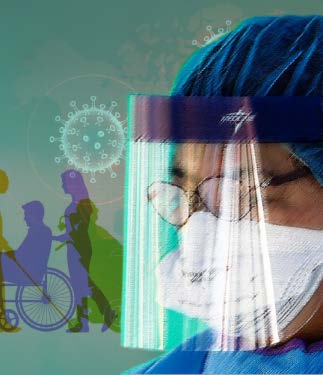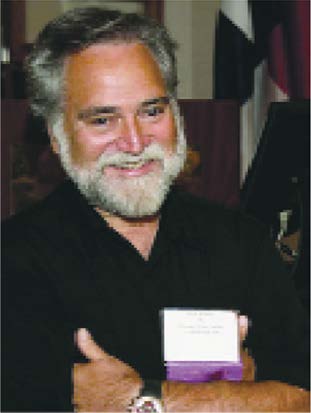ANCORA IMPARO
RICK RADER, MD ■ EDITOR-IN-CHIEF

Inflammation, Inclusion and Intervention
From the entire staff and contributing writers of EP Magazine, we offer the latest news and strategies about caring for people with disabilities during this life-changing COVID-19 pandemic.
Since the beginnings of the disability rights movement and the inception of Exceptional Parent (EP) Magazine in 1971, one word, one ideal, and one goal has taken center stage. Inclusion. Incredible energy, sacrifices, and determination have provided people with disabilities the hope that they would be included into every social network, societal crevice, and community happening. There is every sign that progress has been made on all of those fronts. Most current slices of life those fronts. Most current slices of life now include people with disabilities. Since the beginning, there is one societal activity that has never refused or rejected anyone, including people with disabilities. Everyone has always been expected to be a part of plagues. In the history of the world, there have been a multitude of epidemics, pandemics, contagions, plagues and wildfire infectious diseases. Smallpox (420 BC-1979), Spanish Flu (1918-1919,) Black Death (1340-1771), malaria (1600-today), AIDS (1981-today), cholera (1817-today), typhus (430 BC-today) have always had a place for people with disabilities. Early on, they were fractionally represented only because they didn't live long enough to actually belong to the mainstream populations. But they were always "included" in the millions of individuals who died in these "made for Hollywood horror movie script pandemics"
The rise of the Coronavirus invaders is the newest member of that elite group of things you can't see but can harm and kill you – and they have every intention of including everyone. It is Nature at her best, demonstrating that total inclusion is not only possible but is ongoing. From recent research studies, we are beginning to appreciate the role of "inflammation" in the natural history of COVID-19. Jessica Hamerman, an immunologist at Benaroya Research Institute in Seattle, explains. When immune cells try to fight an infection, "they make a lot of toxic molecules, and those toxic molecules can cause a lot of tissue damage." The results are familiar to many people who've had the flu. Aches, fever and inflammation are actually symptoms of the immune system's attack, not of the influenza virus itself. Cytokine storms occur when the immune system gets stuck trying to fight a disease, Hamerman says. Cytokine molecules summon various immune cells to swoop in and attack an infection. Normally, they turn on only briefly, then shut off when help arrives. But when a storm occurs, they keep sending the alarm long after it's needed.
The role of inflammation might have a part in future treatments for COVID-19. Certainly, the risk factors for poor outcomes relate to inflammatory mediators. Obesity, heart disease, respiratory disease, arthritis, gastrointestinal disorders and yes, age, are the culprits – culprits who are card-carrying members of the "inflammation gang".
It is of interest that individuals with the vast majority of intellectual and developmental disabilities are no strangers to these disorders. And there is the basis for total "inclusion."
Dan Brown observed, "Only one form of contagion travels faster than a virus. And that's fear." That "fear" has become part of the support system that has been activated since COVID19 announced that people with disabilities are on their passenger list. This "fear" – fueled by an appreciation of the natural history of the coronavirus – has (perhaps) forever changed the way we view, provide and plan supports.
The May issue is typically the Mobility-themed edition of Exceptional Parent Magazine. However, like airline flights, schools, vacations, proms, sporting events, conferences, family reunions, the adoption of puppies, and the entire economy, it has been postponed due to the pandemic. Yet, it might be appropriate for this month's issue to be the COVID-19 Special Edition of EP. Mobility is the study of how we move about, how we can get from here to there, and how people can gain access to the things, places, positions and events they feel they deserve to be included. Coronavirus is the personification of mobility, but in reverse. It has demonstrated to us how movement and motion can, at a moment's notice, be derailed, denied and disrupted. It has pro vided a need, an innovative need, to conjure up how to be galvanized, but not paralyzed by fear.
Communicable diseases existed during humankind's hunter-gatherer days, but the shift to agrarian life 10,000 years ago created communities that made epidemics more possible. Malaria, tuberculosis, leprosy, influenza, smallpox and others first appeared during this period. In many ways, despite our advanced and technological present, we are still hunters and gatherers.
Perhaps pandemics are the price we pay for the way we live; or at least the way we prefer to live.
From the entire staff and contributing writers of EP Magazine, we offer the latest news and strategies about caring for people with disabilities during this life-changing COVID-19 pandemic. While the entire staff, our sup porters, contributors, and most certainly readers hope this current COVID-19 pandemic will become part of the host of events that challenge us to ask, "Where were you when…," history has demonstrated that this will not be the last encounter with the viral assault. The information contained in this special issue of EP should continue to have relevance as we continue to prepare for what may come our way in the future months. •

ANCORA IMPARO In his 87th year, the artist Michelangelo (1475 -1564) is believed to have said "Ancora imparo" (I am still learning). Hence, the name for my monthly observations and comments. – Rick Rader, MD, Editor-in-Chief, EP Magazine Director, Morton J. Kent Habilitation Center Orange Grove Center, Chattanooga, TN